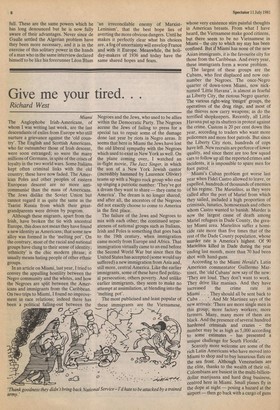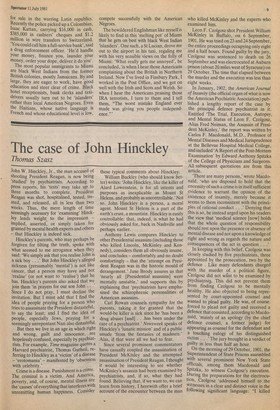Give me your tired. . •
Richard West
Miami The Anglophobe Irish-Americans, of whom I was writing last week, are the last descendants of exiles from Europe who still nurture a grievance against the 'old country'. The English and Scottish Americans, who far outnumber those of Irish descent, were soon estranged; so were the many millions of Germans, in spite of the crises of loyalty in the two world wars. Some Italians kept often criminal links with the old country; these have now faded. The American Poles and other peoples of eastern European descent are no more anticommunist than the mass of Americans. The Jews dislike the Soviet Union but cannot regard it as quite the same as the Tsarist Russia from which their greatgrandparents were driven by pogrom.
Although these migrants, apart from the Irish, have broken the tie with ancestral Europe, this does not mean they have found a new identity as Americans; that some new alloy was formed in the 'melting pot'. On the contrary, most of the racial and national groups have clung to their sense of identity; 'ethnicity' is the chic modern phrase; it usually means hating people of other ethnic groups.
In an article on Miami, last year, I tried to convey the appalling hostility between the Negro community and the whites, and how the Negroes are split between the Americans and immigrants from the Caribbean. On two trips to Miami, I found no improvement in race relations; indeed there has been a political falling-out between the C7 Negroes and the Jews, who used to be allies within the Democratic Party. The Negroes accuse the Jews of failing to press for a special tax to repair some of the damage done last year by riots in Negro areas. It seems that here in Miami the Jews have lost the old liberal sympathy with the Negroes which used to exist in New York as well. On the plane coming over, I watched an in-flight movie, The Jazz Singer, in which the son of a New York Jewish cantor (incredibly hammed by Laurence Olivier) teams up with a Negro rock group who end up singing a patriotic number: 'They've got a dream they want to share — they came to America'. The dream is no longer shared; and after all, the ancestors of the Negroes did not exactly choose to come to America in the first place.
The failure of the Jews and Negroes to mix with each other; the continued separateness of national groups such as Italians. Irish and Poles is something that goes back to the 19th century, when immigration came mostly from Europe and Africa. That immigration virtually came to an end before the Second World War but since then the United States has accepted (some would say suffered) a new immigration from Asia and, still more, central America. Like the earlier immigrants, some of these have fled political persecution; others poverty. And unlike earlier immigrants, they seem to make no attempt at assimilation, at blending into the 'melting pot'.
The most publicised and least popular of these immigrants are the Vietnamese, whose very existence stirs painful thoughts in American breasts. From what I have heard, the Vietnamese make good citizens, but there seem to be no Vietnamese in Miami – the city to which my stay has been confined. But if Miami has none of the new Asian immigrants, it is the favourite city for those from the Caribbean. And every year, these immigrants form a worse problem.
The largest of these groups are the Cubans, who first displaced and now outnumber the Negroes. The once-Negro quarter of down-town Miami, now nicknamed 'Little Havana', is almost as fearful as Liberty City, the riotous Negro quarter. The various right-wing 'émigré' groups, the operatives of the drug rings, and most of the thieves now carry weapons; as do the terrified shopkeepers. Recently, all Little Havana put up its shutters in protest against the crime. Custom is 20 per cent down this year, according to traders who want more policemen and more foot patrols. But since the Liberty City riots, hundreds of cops have left. New recruits are perforce of lower quality, and since there are too few squad cars to follow up all the reported crimes and incidents, it is impossible to spare men for foot patrol.
Miami's Cuban problem got worse last year when Fidel Castro allowed to leave, or expelled, hundreds of thousands of enemies of his regime. The Marielitos, as they were called after the port of Mariel from which they sailed, included a high proportion of criminals, lunatics, homosexuals and others whom Castro wanted to banish. Murder is now the largest cause of death among Mariel refugees in Dade County, the greater Miami area. Marielitos suffer a homicide rate more than five times that of the rest of the Dade County population, whose murder rate is America's highest. Of 90 Marielitos killed in Dade during the year ending last month, more than 70 had been shot with hand-guns.
According to the Miami Herald's Latin American commentator Guillermo Martinez, the 'old Cubans' now say of the new: 'They are loud. They don't want to work. They drive like maniacs. And they have increased the crime rate in Miami . . . They should all be sent back to Cuba • • . '. And Mr Martinez says of the new arrivals: 'There are more single men in this group; more factory workers; more farmers. Many, many more of them are black. And the presence of several hundred hardened criminals and crazies – the number may be as high as 5,000 according to some estimates – has presented a unique challenge for South Florida'.
Scarcely more welcome are some of the rich Latin Americans who have moved into Miami to shop and to buy luxurious flats on the sea front. Although Venezuelans are the elite, thanks to the wealth of their oil, Colombians are busiest in the multi-billiondollar marijuana and hard drug business, centred here in Miami. Small planes fly in the dope at night — posing a hazard at the airport — then go back with a cargo of guns for sale in the warring Latin republics. Recently the police picked up a Colombian, Isaac Kattan, carrying $16,000 in cash, $385,000 in cashiers' cheques and $1.2 million in wire transfers to Switzerland. 'You could call him a full-service bank', said a drug enforcement officer. 'He'd handle your money, finance you, launder your money, order your dope, deliver it do you': The most popular immigrants to Miami are black West Indians from the former British colonies, mostly Jamaicans. By and large, they are eager to work, have good education and steer clear of crime. Black hotel receptionists, bank clerks and taxidrivers usually turn out to be 'islanders' rather than local American Negroes. Even the Haitians, whose native language is French and whose educational level is low, compete successfully with the American Negroes.
The bewildered Englishman like myself is likely to find in this 'melting pot' of Miami that he gets on best with black West Indian 'islanders'. One such, a St Lucian, drove me out to the airport in his taxi, regaling me with his very sensible views on the folly of Miami: 'What really gets me annoyed', he concluded, 'is when I hear those Americans complaining about the British in Northern Ireland. Now I've lived in Finsbury Park, I worked in the Post Office, and we got on well with the Irish and Scots and Welsh. So when I hear the Americans praising those IRA terrorists, I turn to them and I tell them, "The worst mistake England ever made was giving you people independence."



































 Previous page
Previous page